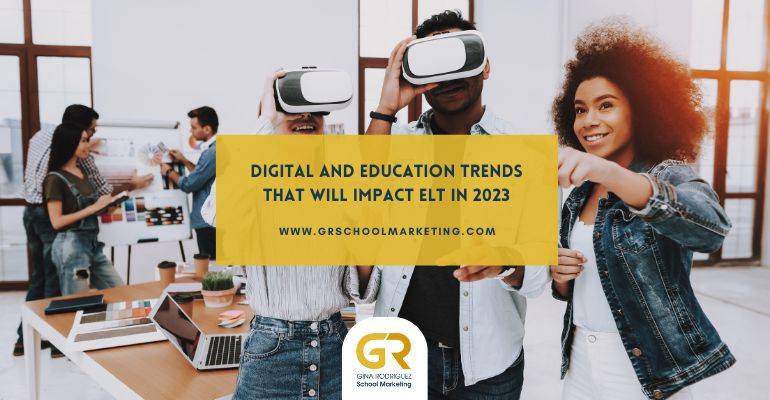Digital and Education Trends that will impact ELT in 2023
Education Trends and Digital Trends almost always have an impact on the English Language Teaching (ELT) industry at a certain point. For this reason, checking what is trending in education and in technology will allow language schools to plan in which direction they should move in ELT and ELT marketing to be ahead of the game.
Knowing about digital and education trends that will impact ELT this year is fine but being ready to embrace a trend will give your language education services an advantage in the market as you will come up as innovative and thus differentiate from competitors. Differentiation is vital to thriving and surviving in a saturated ELT market.
In preparation for writing this blog post I went through “Education Trends that will impact ELT in 2022”, the blog post I wrote last year, to see how things turned out in the end.
Clearly, some trends stopped being a trend and became more established in ELT practices such as micro-learning, life-long learning and developing a green mindset in ELT. Of course, this doesn’t mean ELT professionals stopped talking about them. It means they’ve gone into another phase of large-scale implementation in school programmes and materials.
“A trend is a general direction of change that is developing and becoming more common. This means that it is not common yet but it will become as it continues to develop and to be adopted”
Trends that will affect ELT in 2023
In this article, I will go through education and digital trends that will have an impact on ELT in 2023 and explore ways language services can turn them into opportunities for course improvement and better ELT marketing.
Hi, I’m Gina Rodriguez. I’m a Marketing Consultant specialized in language education with 25+ years in the ELT sector.
I help language schools and independent language professionals build an engaging social media presence through training, consultancy and tailored social media marketing strategies. Find out more about me here.

I hand-picked the trends after observing conversations in ELT circles on social media, going through various reports and noticing how certain topics are becoming more and more common in well-known ELT conferences.
Let’s start with digital trends that will impact ELT in 2023
From a digital perspective there are three main digital trends at the moment that will gain more and more space in ELT before going mainstream in language schools:
- Virtual Reality
- Artificial Intelligence (AI), specially ChatGPT
- The Metaverse

I know this might sound like science fiction to many, but actually, these three tools are here and advancing really fast. The most revolutionary of the three is without a doubt ChatGPT for its incredibly accurate interaction with humans at a zero cost for the time being.
Example of Augmented Reality
What’s the difference between Virtual Reality, Augmented Reality, Artificial Intelligence & The Metaverse?
Just for the sake of clarity and for the sake of less techy readers let me explain the main difference between them in very simple terms.
- Virtual Reality
VR is a computer-simulated situation in 3D that immerses the learner in another reality by using goggles and a controller. It is used in museums for example to help you experiment with life in past eras.
(This is different from Augmented Reality which is used to see renderings in 3D of real-life environments. You see the real place with an extra “layer” of computer generated content).
2. Artificial Intelligence (AI)
AI is when computers execute tasks that normally require human intelligence, like answering questions as Alexa and Google do. Another example of AI that you may be familiar with is chatbots on Messenger. The latest AI-based tool is ChatGPT from OpenAi

ChatGPT (Generative Pre-trained Transformer) is an artificial intelligence (AI) tool that uses natural language processing techniques to generate human-like text in response to human prompts.
In other words, you ask ChatGPT a question or provide a prompt and it will reply using natural language.
3. The Metaverse
“The Metaverse is an online, open, shared, persistent, three-dimensional virtual realm that offers people to connect with each other from all parts of their lives. It would link many platforms, same as how the world wide web connects several websites using one browser.”
Blockchain Council
How will VR, ChatGPT and the Metaverse impact ELT in 2023?
I believe the digital trend that is going to have the biggest impact on ELT in 2023 is ChatGPT . This is simply because it can be accessed for free by anyone at the moment. VR and the Metaverse will probably take longer to go mainstream as using them imply costs for implementation, materials and teacher training.
ChatGPT in ELT
ChatGPT will impact teachers, schools, students, materials everything around education and also ELT. Teachers can have lesson plans written for them, any grammar rule explained, pieces of writing improved and so on. The same applies to students who can ask ChatGPT to write their essays, improve their written work and answer doubts they have about grammar usage, expressions and so on.
In practical terms, it will be fun to experiment with it in class to practise question-making and writing prompts and it will also be vital to raising awareness on being always cautious with the info you get. Critical thinking skills will be a must in education. As a school, it will also be important to warn parents about the opportunities and challenges of ChatGPT for students in a way that they can be vigilant and help their children use it wisely.
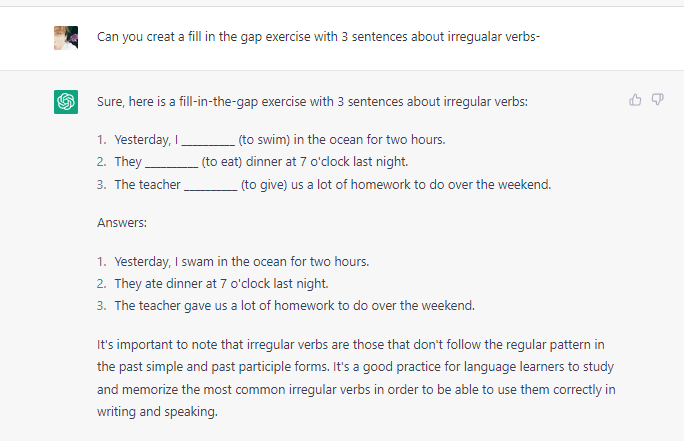
ChatGPT and ELT Marketing
For language school marketing ChatGPT can certainly help with writing compelling social media posts and newsletters and all sorts of communication BUT… be careful! After some time the content becomes repetitive. The same words tend to come up again and again. ChatGPT isn’t very creative and the quality of the output depends very much on the quality of your input/prompt because, after all, it’s artificial intelligence!
I’d use it for brainstorming but I wouldn’t rely on every sentence it gives you. As I wrote in my last NEWSLETTER , “if you use it you run the risk to sound robotic if you don’t add your own personal touch. What’s worse, you may sound just like hundreds of other schools”.

Apart from ChatGPT, there are other ways to use AI. Artificial Intelligence can be integrated into your marketing by the use of ChatBots. These can help with customer enquiries on Messenger or WhatsApp for example just as many companies are already doing it. Chatbots take the burden off your admin staff’s shoulders and they can use the freed time to sell your courses and help students with more personalized customer service.
Chatbots could also spare teachers from answering boring and repetitive grammar questions. Imagine a language learning chatbot that answers questions from language learners inside their platform or on the school’s website.
Virtual Reality in ELT and ELT Marketing
Virtual Reality isn’t science fiction. It has “landed” in ELT too. It’s a new tool and as it usually happens new technologies arrive first and only after some time tailored teacher training and materials arrive. This means that in between, there’s some trial and error for early adopters and lots of talks and discussions about the benefits and how they can be integrated. In my opinion, 2023 will see an increase in interest in Virtual Reality, the Metaverse and AI in general. I can foresee these topics coming up at every ELT conference. However, there’s a gap between the potential of VR for language learning and its implementation in existing schools. Unlike ChatGPT, VR implies having materials, the right equipment and training which implies extra costs.
Actually, some new ELT material for VR is already out. At the last edition of the ELTons, International House, together with Croatian further-education specialists Dante and Spanish-based Molehill Holdings, launched Virtual Reality for Language Learners (VR4LL). VR4LL allows students to explore exciting virtual worlds, including a desert island, an ice world and an ancient Roman city.
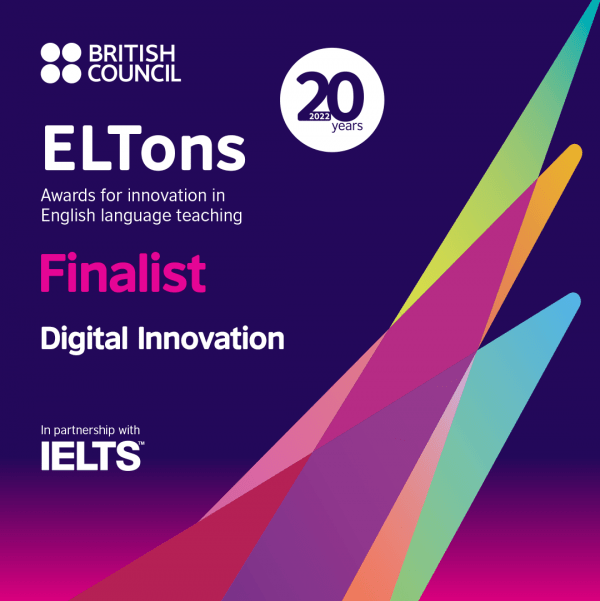
Language institutions can also benefit from VR to market their language courses. Language services will be able to offer an immersive experience to potential students who will simply wear a headset to go on an tour of the school, participate in a demo lesson or in an Open Day.
The Metaverse for ELT
Basically, the Metaverse allows you to go into a 3D world that looks like reality and you have a presence there through your avatar.
So in practice, you move from one environment into the other being always your avatar and interacting with other avatars (students from other parts of the world?). You have your own identity and you will need currency, clothes and so on to live in the Metaverse.
I asked ChatGPT how a language school can use the Metaverse for teaching a language. Here’s the answer:
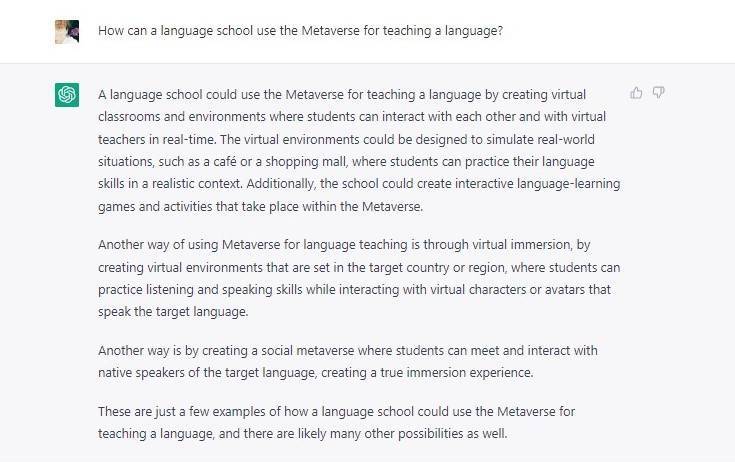
ChatGPT suggests the creation of a Metaverse with virtual classrooms where students can interact with each other and also with virtual teachers in simulated real-world situations to practise their skills in a real context.
Metaverse for ELT: opportunities and challenges
The possibility of simulating contexts in the Metaverse is a fantastic opportunity to practise language safely in a fully immersive way.
Imagine bringing into the classroom contexts like a cafè to practise the language. This would be way more memorable than role-playing in class. Also, imagine a doctor learning English to visit patients. This student can practise talking in English with an injured patient in the Metaverse simulating also the tension of the moment.
The potential of using the Metaverse for language education is huge. As for everything new that comes up there are pros and cons. Therefore, it is very much up to us to be sensible to choose the right direction and the right dose of the new technology to embed in the language programme. In other words, it’ll be important to find the right balance.
How soon will the Metaverse be in language schools?
Considering that language schools still struggle to have decent technology even in industrialized countries like Italy, I don’t think the Metaverse will land too soon in the private language school sector despite all the hype of the moment. However, it’s important to keep an eye on how things develop. In the meantime why not try Metaverse–type activities as suggested by ELT “Digital Guru” Mr Nick Peachey in his article “Discover the metaverse and what it can offer teachers!” (click here).
I believe Ed-tech companies must be very busy and excited at the moment planning how to integrate all these new digital tools into language learning platforms . So we need to watch the Ed-tech space for exciting news!
Let’s move on to Education trends that will impact ELT in 2023:
New education trends are usually driven by the change in lifestyle and the economy (somehow always driven by technology!). They are propelled by research and guidelines by UNICEF, the Council of Europe and the World Economic Forum among others.
I think that the following education trends will impact ELT in 2023:
- Soft skills for Employability
- Social Emotional Learning
- Inclusion & Diversity
- Financial Literacy
Education Trends that will impact ELT in 2023: Soft Skills for Employability
“There’s been a shift in ELT from English being a subject to an indispensable tool for global communication” .
This statement at the ELTons ceremony is a massive recognition of how English teaching has changed. It is a call to everyone in ELT to take onboard this new aspect of ELT and teach accordingly. I think that those that don’t embrace this change will lose students.
People need English for employability, for global communication and to work in diverse environments trying to keep a balance between work and life.
There are two big signs that soft skills for employability are trending and will impact ELT in 2023:
- The “Employability Framework” by Pearson
- Stats by the World Economic Forum.
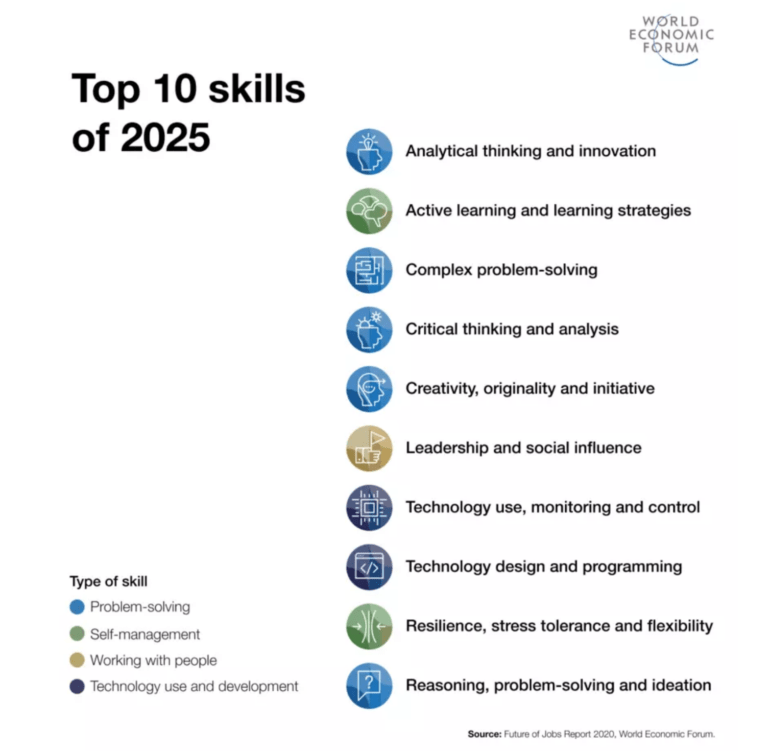
In my opinion, a language school that embeds these skills in its syllabus is certainly a school that will prepare students better than their competitors. By embedding these skills they will be teaching English as a tool and not just as another subject. This is what will differentiate language courses from now on.
Education Trends that will impact ELT in 2023: Social-Emotional Learning
Some of the described education trends have just come into recent publications for ELT as seen at the ELTONS. For example, Brain Juice by the University of Dayton Press has picked Self- Awareness, Personal Autonomy and Artistic Expression from the Unicef Framework of Transferable Skills. Then from the UN’s Sustainable Development Goals, they have chosen not only Social Justice but also Global and Environmental Awareness.”
Other ELTON winners’ focus was on global awareness self-awareness and emotional well-being. Clearly, there’s a trend in everything under the Social Emotional Learning umbrella.
We can expect more seminars and workshops on how to apply these skills in practical terms. Hopefully, more school directors and teachers will be looking at integrating these skills into the daily classroom.
Education Trends that will impact ELT in 2023: Inclusion & Diversity
This is a broad category that encapsulates not only the inclusion of multicultural students and special educational needs learners but also LGBTQ rights and the rights of non-native language teachers to equal job opportunities in ELT.
The trending topics in this category are the last two. There has been more attention lately on how ELT materials should reflect the society we live in. Also, there are lots of conversations on social media about native-speakerism and how to be more inclusive of non-native teachers.
My Instagram friend Meri Maroutian @the_non_native_speaker has been very active on the platform to raise awareness about native speakerism in ELT and to help non-native teachers be prepared to face the challenge. Her blog is worth visiting if you want to educate yourself about native-speakerism. I’d also recommend reading her latest article in the EL Gazette (click here)
As an ELT Marketing consultant, I have been talking about how to move away from discriminatory social media ads. It’s time to start using unique selling points instead of the cliche “madrelingua” in language school marketing. I’m sure the discussion will continue into 2023 as it’s early days to see any mainstream adoption of a more inclusive ELT marketing and advertising.
Education Trends that will impact ELT in 2023: Financial literacy
Financial literacy is an essential skill for the 21st century as stated in the title of Volume VI of the PISA report. What’s more, it’s also connected to Goal number 8 of the Sustainable Development Goals. Despite this, there are poor signs of financial literacy in education. However, due to the current climate in the economy, it will probably start to tiptoe into the classroom. This may be through ways of saving energy, stopping wasting resources and hopefully as a way to achieve goal 8 of the SDG.
How can language institutions use digital and education trends to enrol more students?
All of the digital and education trends mentioned in this article are for their nature not mainstream in ELT yet. Well-informed language institutions might want to choose to integrate them into their programmes through projects and ad-hoc lessons and materials. By doing so they will give their students an enormous advantage truly teaching them English as a tool rather than a subject.
If these schools then showcase their innovative topics and lessons in their marketing, they will certainly get the attention of potential students. In this way, they will also stand out in the local market gaining authority along the way.
Finally, I’d like to say that I don’t see AI, ChatGPT, the Metaverse or Virtual reality as threats to schools or teachers. I think they can only bring opportunities as long as we learn how to use them, exploit their potential with a sound pedagogy at the heart of the course and educate ourselves and our students on their ethical use too.
To discuss these trends further in view of how to integrate them into your school’s marketing, feel free to get in touch. Book a discovery call to see how I can help. Get in touch through the contact form by clicking here.
NB This article was written by a human!


